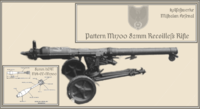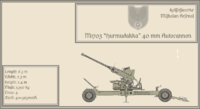Hurmu Peace Corps

| |
| Active: | 1694 AN – 1720 AN |
| Motto: | |
| In use by: | |
| Allegiance: | Order of the Holy Lakes |
|
| |
| Type: | Civic Protection & Humanitarian Force |
| Role | Combined Arms |
| Size: | 308,190 contracted personnel |
| Branches: |
|
| Current Commander: | Senate of the Lakes |
|
| |
| Allies | |
| Opponents | |
| Conflicts & Deployments | |
The Hurmu Peace Corps was the branch of the Hurmu government tasked with protecting the peace of the people and state of Hurmu. The Hurmu Peace Corps was established in 1694 through a constitutional amendment after it was found that the Hurmu Constabulary, being Hurmu's police force, was not legally sanctioned to provide for the protection of the peace in a more preventive manner. It was abolished in 1720 AN with its assets and personnel transferred into the Hurmu Fyrð.
The Hurmu Peace Corps was thus tasked with preventing breaches of peace of Hurmu and the state of Hurmu. It did so through gathering such information as necessary, under the law, to provide for the peace of the people and the state. It also organised volunteers from all over the world to aid in providing for the peace of the people and the state of Hurmu. However, the Hurmu Peace Corps was also authorised under the constitution to defend the peace of Hurmu's people and state through armed means. Further more, the Hurmu Peace Corps could, on the order of the Senate (the collective head of the Hurmu Peace Corps), be deployed abroad or to the Green if it was in the interests of the peace of the people and state of Hurmu or necessary to uphold the peace in a territory ravished by war, calamity or natural disaster.
Those who pledged their service to the Hurmu Peace Corps were collectively known as peacekeepers.
Due to being established only in 1694 by an Act of Parlerment, there was an initial lack of officers and enlisted members in the HPC. As such, the Parlerment also provided for accepting commissions and enlistments from other countries with which Hurmu has treaty relations as equivalent for the rank at hand in the Hurmu Peace Corps, provided the individual applies for provisional Hurmu nationality. Such provisional nationality allowed for the family of the peacekeeper to settle in Hurmu (i.e. the peacekeeper acts as sponsor for his family)
Hurmu nationality would be then granted upon the foreigner peacekeeper (and those he or she sponsored) upon honourable discharge or ten years' service, whichever came sooner. Exceptions occured if the peacekeeper, or a person whom he or she sponsored, had been found guilty of an offence of which a custodial sentence was indicated in the criminal code).
Organisation
The Hurmu Peace Corps was headed by Chief Commissioner of the Peace Corps, who answers directly to the Senate's appointed Secretary of State for Peace. Where the Constabulary answers to the Hurmu Executive (and thus ultimately to the Assembly), the Peace Corps ultimately answers to the Senate. Both Senate and Assembly are involved in budgetting and legislating for both corps.
The Hurmu Peace Corps was divided into four departments, supported by the Peace Academy:
- Sea Department
- Land Department
- Air Department
- Psychology Department
- Peace Academy
Ranks
Regardless of department of service, all peacekeepers have the same structure of ranks.
| Rank code | Name | Comment |
|---|---|---|
| OF-10 | Senate | Equivalent to Commander-in-chief |
| OF-9 | Secretary of State for Peace | |
| OF-8 | Chief Commissioner of the Peace Corps | |
| OF-7 | Commissioner of the Peace | |
| OF-6 | Chief Director of the Peace | |
| OF-5 | Director of the Peace | Requires a master's degree in peacekeeping or equivalent |
| OF-4 | Chief Superintendent of the Peace | |
| OF-3 | Superintendent Inspector of the Peace | |
| OF-2 | Inspector of the Peace | |
| OF-1 | Officer of the Peace | Upon graduation from the Academy of Peace with a bachelor's degree in peacekeeping, or equivalent |
| OF-D | Aspirant Officer of the Peace | Requires passing OR-1, and then admitted to the Academy of Peace |
| OR-9 | Non-commissioned officer of the Peace | |
| OR-8 | Senior Ranger of the Hurmu Peace Corps | |
| OR-7 | Junior Ranger of the Hurmu Peace Corps | |
| OR-6 | Senior Warden of the Hurmu Peace Corps | |
| OR-5 | Junior Warden of the Hurmu Peace Corps | |
| OR-4 | Senior Specialist of the Hurmu Peace Corps | |
| OR-3 | Junior Specialist of the Hurmu Peace Corps | |
| OR-2 | Volunteer of the Peace Corps | |
| OR-1 | Trainee of the Hurmu Peace Corps |
Regimental structure
The administrative foundation of the HPC is the regiment, comprised of 1,200 peacekeepers under arms divided between three cohorts each under the command of a Superintendent Inspector of the Peace, with 360 men per cohort, and an HQ & Supply Echelon squadron of 120 peacekeepers under the command of a Inspector of the Peace who serves as the regimental adjutant. The regiment itself is commanded by a Director of the Peace, supported by two Chief Superintendents of the Peace who serve as Executive Officer and Quartermaster respectively. If required the regiment will divide its strength into two demi-regiments, each under the command of one of the two Chief Superintendents of the Peace, with the third cohort of the regiment dividing so as to reinforce each of the remaining two cohorts with a squadron-strength detachment, with the third squadron of the third cohort amalgamating with the HQ & Supply squadron.
Cohorts divide into three squadrons, each of 120-men each and led by an Inspector of the Peace. These squadrons in turn divide into three troops of 40-men each which are led by an Officer of the Peace supported by a non-commissioned officer known as a ranger. Troops breakdown into sections of 8-men, each one led by a non-commissioned officer usually a warden.
Each regiment can expect to have up to 70 supernumerary officers of the peace assigned to their formation for the purposes of pay and administration. Unless called upon by higher authorities for other duties, these supernumerary officers remain available to the Director of the Peace to serve as his staff, couriers, close-protection detail, and any other role he may assign them too that is commensurate with their grade.
The ranks of non-officer volunteers within the regiment are assigned by the Director of the Peace on the advice of his Executive Officer and the Non-commissioned Officer of the Peace who has responsibility for the discipline, health, and proficiency, of all other ranks in the regiment.
Regiments are assigned to one of the four departments or the Peace Academy and focus accordingly upon developing specialist skills and modes of operation appropriate to the department to which they have been assigned. As the HPC expanded, three regiments were assigned to the formation of a General Staff to support the Chief Commissioner.
| Department | Regiments assigned |
|---|---|
| Sea Department | 32 |
| Land Department | 80 |
| Air Department | 30 |
| Psychology Department | 2 |
| General Staff | 3 |
| Peace Academy | 1 |
| Total | 148 |
Defence Services Command
The Defence Services Command, established on 6.VI.1700 AN, formalised existing contractual and legacy arrangements by establishing liaison staff teams attached to those entities upon whom the Peace Corps relied for critical defence related services.
| Contracted service | Contractor(s) | Contract duration | Notes |
|---|---|---|---|
| Current Contracts | |||
| Allied Mission in Eastern Apollonia, Hurmu & Lyrica | Apollonia Command | 1685 AN– | Supports Air Policing Mission, Visiting Forces Agreement & Hurmu Constabulary |
| Visiting Forces Agreement | Federal Forces of Nouvelle Alexandrie | 1691 AN– | Treaty of Ciudad Howard |
| Territorial Defence | 1714 AN–1724 AN | Standard Terms of Service. Ten year term of engagement (renewable). Wages paid for personnel deployed, plus ten percent per deployed person as commission. See also: Operation Bauk | |
| Air Policing Mission | ESB Aviation Group | 1714 AN–1724 AN | |
| Amaland Garrison |
|
1714 AN–1724 AN | |
| Karnamark Garrison | Army of Karnamark | 1714 AN–1724 AN | |
| Internal Security Tasking | 5th Vanguard Division | 1719 AN–1729 AN | Standard Terms of Service. Ten year term of engagement (renewable). Wages paid for personnel deployed, plus ten percent per deployed person as commission. |
| Expired Contracts | |||
| Air Policing Mission | Federal Forces of Nouvelle Alexandrie | 1691 AN–1701 AN | Treaty of Ciudad Howard |
| Maritime Security (Warring Islands) | Maritime Support Group | 1699 AN–1719 AN |
|
| Territorial Defence | 1700 AN–1710 AN | Standard Terms of Service. Ten year term of engagement (renewable). Wages paid for personnel deployed, plus ten percent per deployed person as commission. See also: Operation Bauk | |
| Air Policing Mission | ESB Aviation Group | 1703 AN–1712 AN | Contract awarded 13.VIII.1703 AN. Contract extended 1.XIII.1707 AN. |
| Amaland Garrison |
|
1707 AN–1712 AN | Contract awarded 1.XIII.1707 AN |
| Karnamark Garrison | Army of Karnamark | 1707 AN–1712 AN | Formalisation of prior arrangement. Contract awarded 1.XIII.1707 AN |
Equipment
The majority of equipment initially available to the Peace Corps was confiscated from rebel Elwynnese and Zeedic contingents, formerly associated with the Allied Mission in Eastern Apollonia, Hurmu & Lyrica, that had interned during the Second Elwynnese Civil War. While the Zeedic personnel were recruited wholesale into the Peace Corps, the conflict in southern Eura effectively preventing their return, the former UDF personnel of the 51st Division elected to be repatriated to rebel-held Cimmeria and Raikoth. The condition of Apollonia Command for the granting of safe passage on the open-seas for the repatriation vessels was that the rebels were to sail wholly unarmed, leaving all of their interned weaponry, munitions, and stores behind in Hurmu. This proved to be a great boon for the Peace Corps, and the foundation of its inventory.
A shortage of small arms obliged the HPC to issue cudgels, pikes, and locally manufactured Florian Cocktails to volunteers, with officers, non-commissioned officers, and peacekeepers on deployment receiving priority for the available stock of firearms. To remedy this deficit, large quantities of assault rifles, machine-pistols, and medium machine-guns were ordered in 1697 AN.
Air equipment
| Item | Manufacturer | Type | Quantity | Image | Notes |
|---|---|---|---|---|---|
| IE-7 Songbird | Trainer / Light Attack | 40 |  |
||
| T-2/A-2 Saeqeh | Trainer / Light Attack | 238 |  |
| |
| T-3 Akóntio | Jet Trainer / Light Attack | 100 |  |
| Item | Manufacturer | Type | Quantity | Image |
|---|---|---|---|---|
| AEW-1 Buscadora | Airborne Early Warning | 5 | 
| |
| Javelin M-2 Dragoon | UAV | 60 | 
| |
| P-2 Navegador | Air Policing / Maritime Patrol | 24 | 
| |
| R-2 Krähenwürger | Heavy Assault Rotorcraft | 146 | 
| |
| T-6 Preceptora | Trainer | 120 | 
|
Land equipment
| Item | Origin | Type | Quantity | Image | Notes |
|---|---|---|---|---|---|
| Clinger Bomb, Adhesive Anti-Tank Grenade | Small Arms | 35,682 |
| ||
| CP 60 "Cherry Picker" 7.62 mm sniper rifle | Small Arms | 17,522 |
| ||
| Cudgel | Small Arms | 985,949 |
| ||
| Florian Cocktail (Tar, sulphur, petrol, sand, & wick) | Small Arms | 8,211,508 |
| ||
| LTM 60 "Trouble Maker" 9 mm submachine gun | Small Arms | 1,177 |
| ||
| M14 Fragmentation Hand Grenade | Small Arms | 5,891 |  |
| |
| M15 White Phosphorus Grenade | Small Arms | 46,935 |  |
| |
| M1508 Martini-Rossi 11.56 mm Rifle | Small Arms | 36,443 |  |
| |
| M1525 9 mm Pistol | Small Arms | 25,259 |  |
| |
| M1581 7.62 mm Machine Carbine | Small Arms | 4,181 |  |
| |
| M1591 7.62 mm Rifle | Small Arms | 23,450 |
| ||
| M1610 7.9 mm Rifle (Semi-Automatic) | Small Arms | 1,443,015 |  |
| |
| M1656 9 mm SMG | Small Arms | 38,134 |  |
| |
| M1686 assault rifle (7.62×67mmB) | Small Arms (Rifle / Carbine) | 200,000 |  |
Delivered 1697 AN–1700 AN | |
| M1690 machine pistol (9x19mm) | Small Arms (Pistol / SMG) | 50,000 |  |
Delivered 1697 AN–1700 AN | |
| M1693 medium machine gun (8x80mm RP) | Machine Gun | 25,000 |  |
||
| M1700 82mm Recoilless Rifle | Regimental Gun | 40 |  |
| |
| M18 Red Smoke Grenade | Small Arms | 5,891 |  |
Confiscated from interned Elwynnese rebels (1693 AN) | |
| Tankgewehr 13.2 mm Rifle (Anti-Materiel) | Inf Spt Wpn | 1 |  |
Confiscated from interned Elwynnese rebels (1693 AN) | |
| Pike | Pole Arm | 100,000 |
| ||
| Polybolos 12.7 mm HMG | Machine Gun | 90 |  |
Confiscated from interned Elwynnese rebels (1693 AN) | |
| Wren 7.62mm LMG | Machine Gun | 35,102 |  |
||
| Hornet 84 mm Recoilless Rifle (Anti-Tank) | Anti-Tank | 3 | Confiscated from interned Elwynnese rebels (1693 AN) | ||
| M1703 "Hurmudakka" 40 mm Autocannon | Artillery | 212 |  |
| |
| M1584 80 mm Field Gun | Artillery | 1,602 |  |
| |
| 82 mm Mortar | Artillery | 450 |
| ||
| 105 mm Light Gun | Artillery | 24 |  |
| |
| BK-III Verteidiger | Main Battle Tank | 18 |  |
Confiscated from interned Elwynnese rebels (1693 AN) | |
| Bytestridsvagn | Main Battle Tank | 255 |  |
| |
| Horjin CV56 | AFV - Infantry Fighting Vehicle | 243 |  |
Confiscated from interned Elwynnese rebels (1693 AN) | |
| Pod Personnel Carrier | Spt Vehicle | 46 |  |
Confiscated from interned Elwynnese rebels (1693 AN) | |
| Rz.Kfz 1714 Razkampfwagen | MRAP | 524/800 |  |
| |
| Truck, Light | Spt Vehicle | 2,673 |  |
Confiscated from interned Elwynnese rebels (1693 AN) | |
| Truck, Medium | Spt Vehicle | 5 | Confiscated from interned Elwynnese rebels (1693 AN) |
Manpower
| Manpower category | Strength | Demographic data | Status |
|---|---|---|---|
| Local Volunteers | 192,160 |
|
|
| Foreign Enlistments | 116,030 |
|
|
Officers
Figures from 1700 AN:
- 1 Chief Commissioner of the Peace Corps
- 5 Commissioners of the Peace (1 per district)
- 5 Chief Directors of the Peace (1 per department)
- 148 Directors of the Peace (1 per regiment)
- 297 Chief Superintendents of the Peace (1 per demi-regiment)
- 494 Superintendent Inspectors of the Peace (1 per cohort)
- 1,483 Inspectors of the Peace (1 per squadron)
- 4,450 Officers of the Peace (1 per troop)
- 1,601 Officers without billets (assigned the rank of Inspectors of the Peace and available for individual assignments)
Other ranks
Note: 49% of new foreign enlistments in 1704 were of Benacian Umraid origin.
Uniforms

In spite of protests in Ayreonist circles at the perceived militarism of wearing a uniform, the HPC had adopted, by the time of the Barikalus-Hurmu war, a uniform that consisted of olive-drab fatigue overalls, an olive-drab or black t-shirt, and a light blue beret.
In a concession to Ayreonist sentiment, still traumatised by the Scouring in Elwynn, the uniforms are not issued with epaulettes, unit and rank badges are removed whilst in civilian areas, and saluting a superior officer is formally a disciplinary offence.